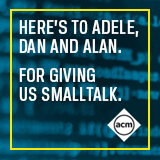
Rate-limiting State:
The edge of the Internet is an unruly place
By design, the Internet core is dumb, and the edge is smart. This design decision has enabled the Internet’s wildcat growth, since without complexity the core can grow at the speed of demand. On the downside, the decision to put all smartness at the edge means we’re at the mercy of scale when it comes to the quality of the Internet’s aggregate traffic load. Not all device and software builders have the skills and the quality assurance budgets that something the size of the Internet deserves. Furthermore, the resiliency of the Internet means that a device or program that gets something importantly wrong about Internet communication stands a pretty good chance of working "well enough" in spite of this.
The Logic of Logging:
And the illogic of PDF
I work in a pretty open environment, and by open I mean that many people have the ability to become the root user on our servers so that they can fix things as they break.
Major-league SEMAT: Why Should an Executive Care?:
Becoming better, faster, cheaper, and happier
In today’s ever more competitive world, boards of directors and executives demand that CIOs and their teams deliver "more with less." Studies show, without any real surprise, that there is no one-size-fits-all method to suit all software initiatives, and that a practice-based approach with some light but effective degree of order and governance is the goal of most software-development departments.
Multipath TCP:
Decoupled from IP, TCP is at last able to support multihomed hosts.
The Internet relies heavily on two protocols. In the network layer, IP (Internet Protocol) provides an unreliable datagram service and ensures that any host can exchange packets with any other host. Since its creation in the 1970s, IP has seen the addition of several features, including multicast, IPsec (IP security), and QoS (quality of service). The latest revision, IPv6 (IP version 6), supports 16-byte addresses.





